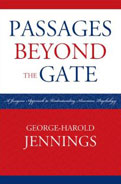 |
Passages Beyond the Gate: A Jungian Approach to
Understanding American Psychology by George-Harold Jennings University Press of America
book review by Priscilla Estes
"American psychology cannot hope to provide a deep spiritually and intuitively based understanding of human nature as long as it blocks, denies or suppresses the full creative expression of intuition in its psyche."
The importance of intuition has been overlooked in modern American psychological theories. Psychology's four great forces—behavioral, biologic, psychoanalytic and humanistic-existential—have trouble accepting the function of pure intuition, which is at the core of transpersonal psychology. Yet intuition is Jung's fourth pillar of the human psyche, behind perception, thinking and feeling. Without a highly developed intuitive function, we can't tap into the realms of ideas and hidden essences where answers can be found.
With formidable clarity and concrete examples, Jennings links the four forces in American psychology with Jung's four pillars of the psyche to illuminate the undervalued transpersonal psychology/intuitive function. Transpersonal psychology is an important movement, offering answers to the questions, "Where is humankind going?", "What is my purpose in life?" and other critical spiritual concerns.
A serious, well-researched, comprehensively footnoted and readable monograph on the need for mainstreaming a spiritually imbued psychology is refreshing. Many treatises on using spirituality to elevate human consciousness disintegrate into subjective soap-boxing and coffee-shop Zen. Professor Jennings, a Yale-trained clinical psychologist and Jungian thinker devoid of mysticism, advocates transpersonal psychology to open passages in the wall that separates the material and secular views of human nature from the spiritual one in American psychology. He creatively applies Jung's four functions of consciousness to support an intuitively based psychology.
This slim book is a gem for readers with an above-average interest in American psychology and a desire to understand how science and spirituality can be merged, especially in a world where secular and materialistic views abound.
